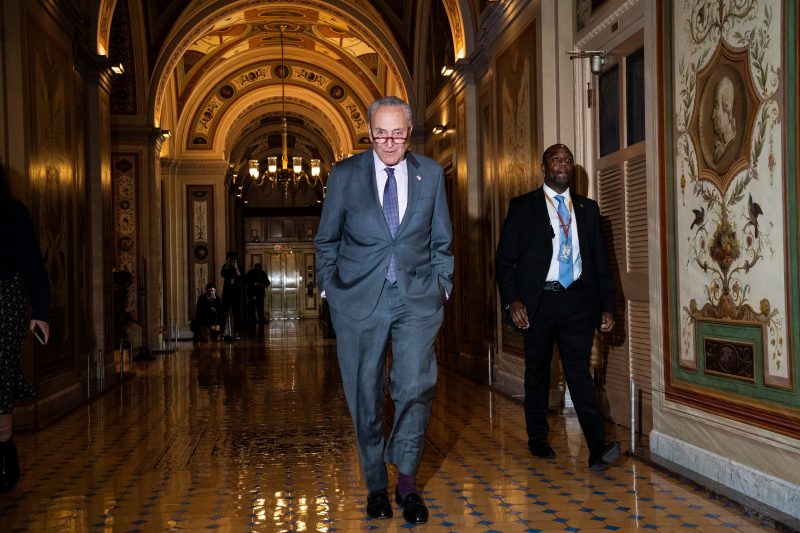Senate leaders are imploring their colleagues to move quickly to approve a House-passed bill ahead of a Monday deadline that would suspend the debt ceiling, limit federal spending and avert a catastrophic U.S. government default.
The 99-page legislation brokered by House Speaker Kevin McCarthy (R-Calif.) and President Biden cleared the House on Wednesday night on a 314-117 bipartisan vote. Senators are expected to follow suit, but it remains unclear how quickly they will move.
Both Senate Majority Leader Charles E. Schumer (D-N.Y.). and Senate Minority Leader Mitch McConnell (R-Ky.) have urged their colleagues to act well before Monday, when the nation will no longer be able to pay its bills.
But a handful of senators are angling to add amendments to the legislation that could slow the process. Some have expressed a desire for deeper spending cuts, an increase in defense spending and the removal of a provision that would fast-track a controversial pipeline that would carry natural gas across West Virginia and Virginia.
Any changes to the bill would send it back to the House, making it impossible to meet the Monday deadline. Schumer made clear Tuesday that he doesn’t want that to happen.
“Either we proceed quickly and send this bipartisan agreement to the president’s desk or the federal government will default for the first time ever,” Schumer said on the Senate floor. “We’re getting close to finally putting the threat of default behind us, but there’s more work to do.”
McConnell has also signaled he wants to move quickly to get the legislation to Biden, telling reporters Wednesday that he was “proud to support it without delay.”
In the House, many liberal Democrats opposed the bill, objecting to curbs on government spending and to new work requirements for some recipients of federal food stamps and family welfare benefits. Far-right Republicans also harshly criticized the agreement for not securing more aggressive spending cuts.
But Biden praised the bill after its passage.
“This budget agreement is a bipartisan compromise. Neither side got everything it wanted,” he said. “I have been clear that the only path forward is a bipartisan compromise that can earn the support of both parties. This agreement meets that test.”
While several senators are pressing for amendment votes, none so far has said they are seeking to derail the legislation. In theory, if all 100 senators can agree, the Senate could pass the bill as early as Thursday. But several obstacles remain.
Sen. Rand Paul (R-Ky.) indicated that he’s willing to allow the deal to move through the Senate at a faster rate in exchange for a vote on an amendment that would cut total federal spending by 5 percent a year.
Sen. Mike Lee (R-Utah) told reporters he doesn’t “have any desire to hold [the legislation] up for the sake of holding it up.” But he plans to also propose his own amendments, though he didn’t offer any details about them.
Sen. Lindsey O. Graham (R-S.C.) has said he wants to boost defense spending, while Sen. Tim Kaine (D-Va.) wants a vote on removing the provision on the 303-mile Mountain Valley Pipeline project.
The project, championed by Sen. Joe Manchin III (W-Va.), has drawn opposition from local residents and climate activists.
The legislation, as passed by the House, would suspend the debt limit until Jan. 2. 2025. The Congressional Budget Office says the proposal will reduce the deficit by $1.5 trillion over the next 10 years.
The debt ceiling caps the amount the U.S. government can borrow. The current level is $31.4 trillion, and the Treasury Department has been using what it calls “extraordinary measures” since January to shuffle money around in the federal budget to avoid needing to take on more debt.
Marianne LeVine contributed to this report.
